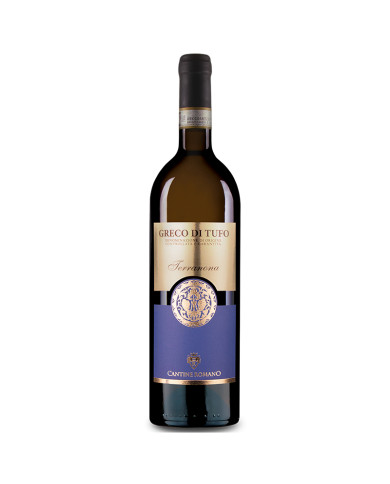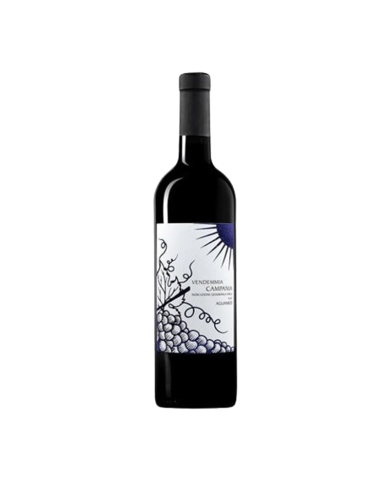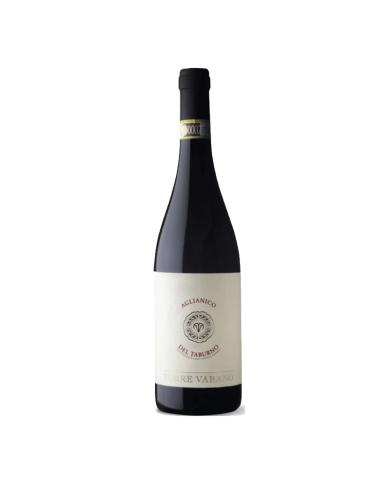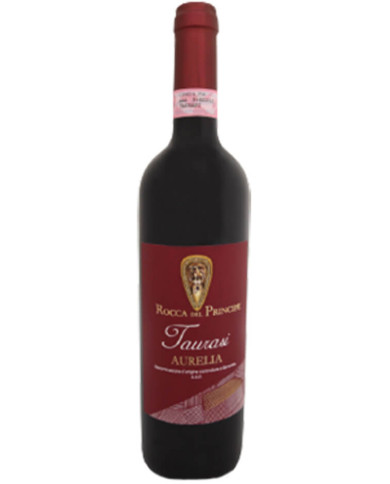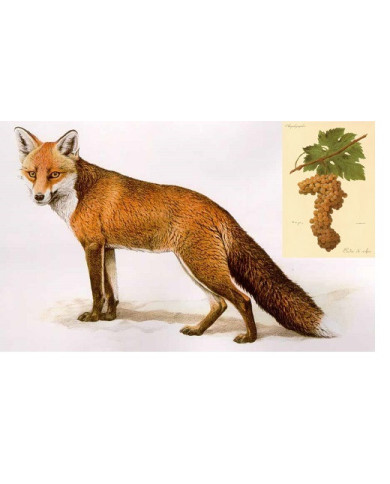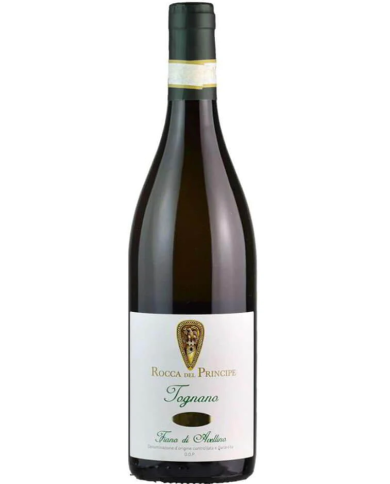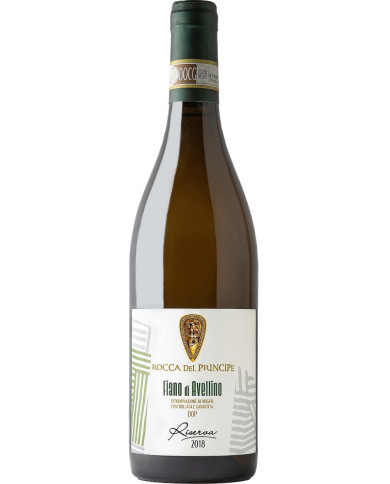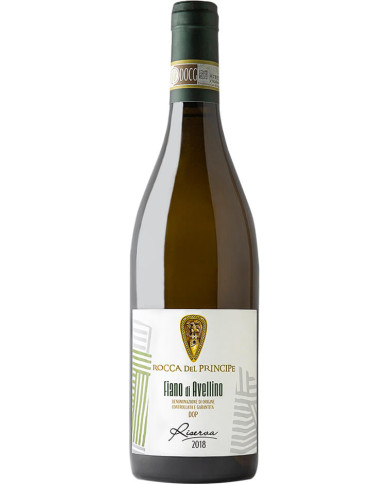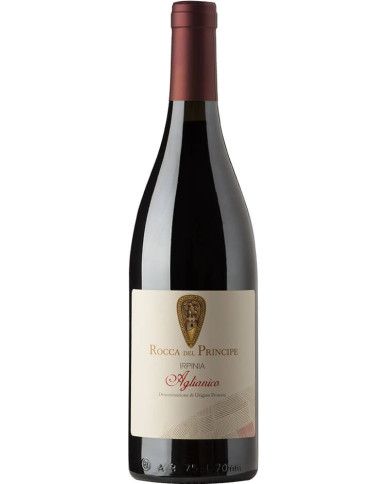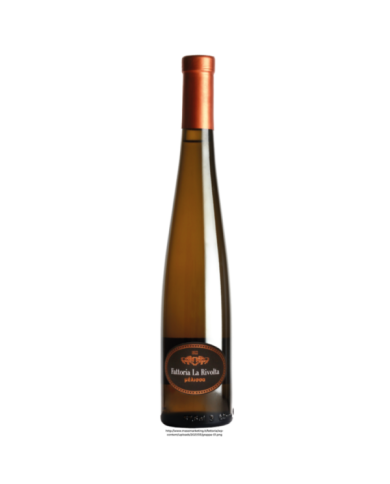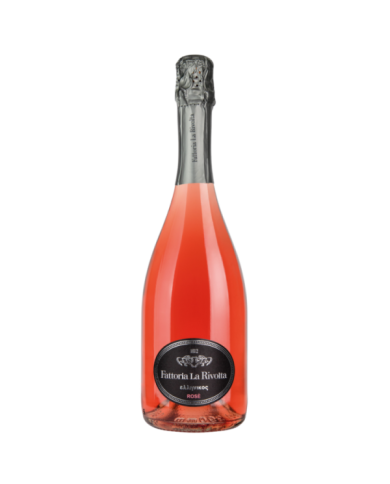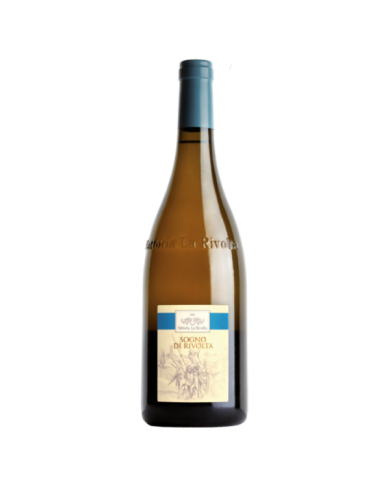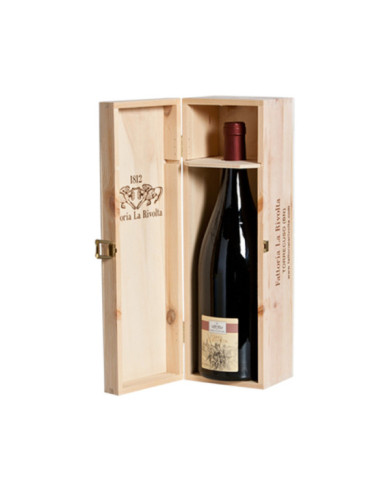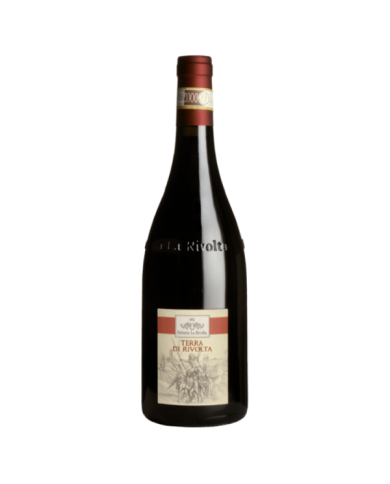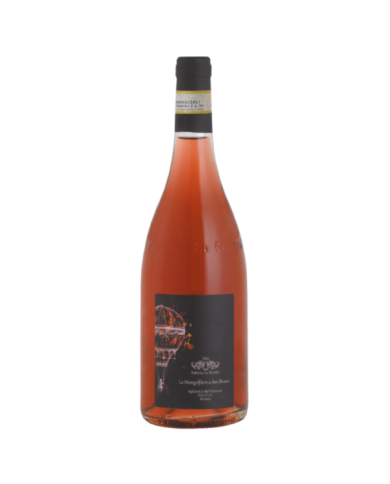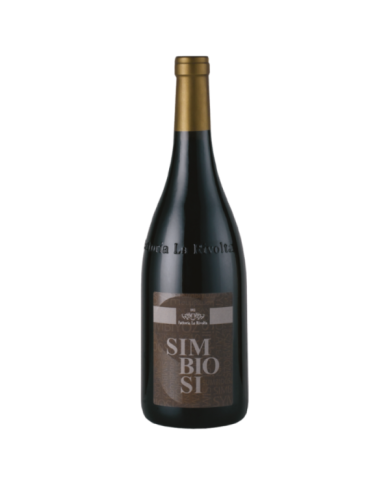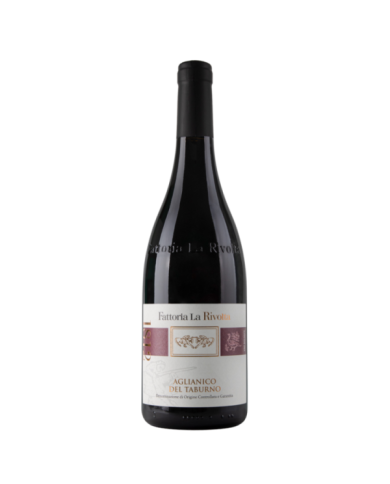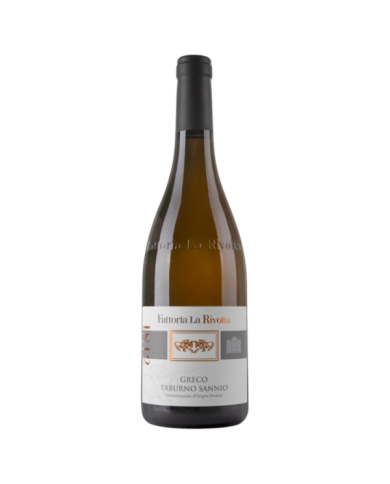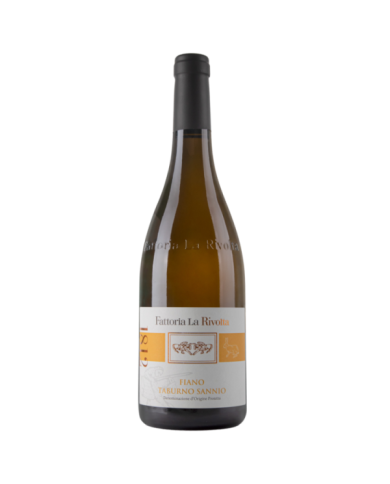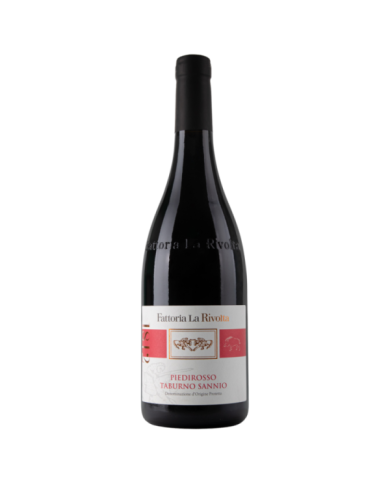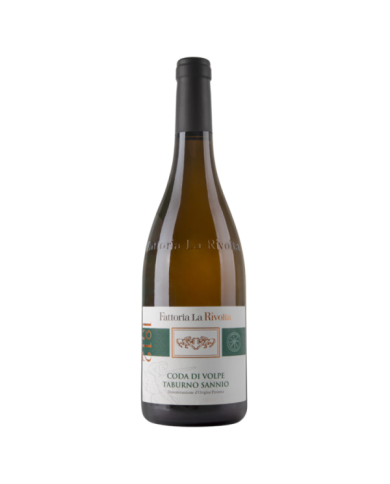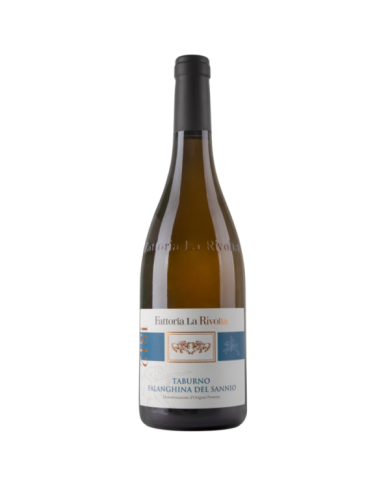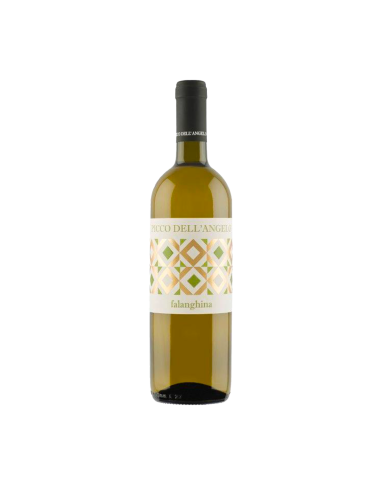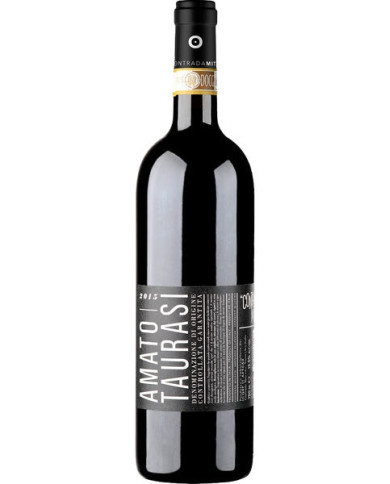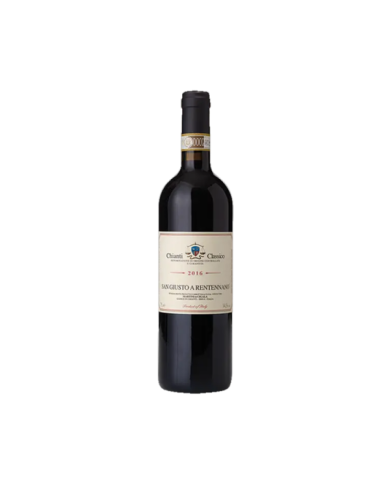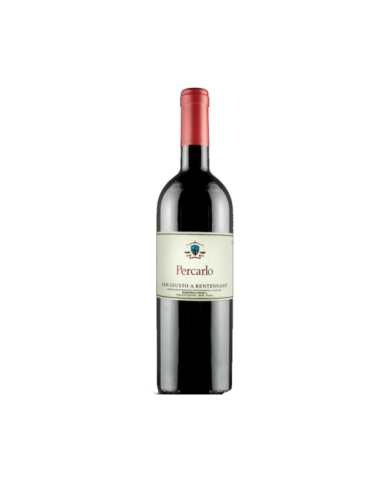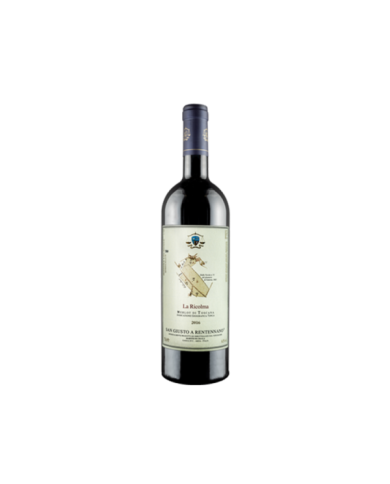A fruity aftertaste, a fine persistence, a fresh and savory timbre, a good body with floral notes, an intense and soft tone.
Crushing-destemming, fermentation in steel at uncontrolled temperature for 15 days. Stop for 12 months on the fine lees and at least 4 months in the bottle. A wine that the vintage has made easy to drink without betraying the olfactory and spicy qualities typical of this wine.
Aglianico Torre Varano is the red wine that you will appreciate for its gustatory balance, acquired with the aging time.
Aglianico is the vine which, together with Fiano, represents the peasant culture of the Campania region. The soil where this vine is found is composed of clayey and calcareous marl with a South/East exposure. The company begins harvesting the grapes from the beginning of November and, after pressing, the must ferments in contact with the skins for about 25 days. This is followed by malolactic fermentation and subsequent aging in barriques for 12 months and 12 in Slavonian oak barrels. The refinement in the bottle is for another 18 months. In the glass this wine has an intense ruby red colour. The nose is intoxicated by its large bouquet of black cherry, plum, spices, tobacco and balsamic notes. On the palate it is decisive, warm, rich and rightly tannic. The finish is long and persistent with an aroma reminiscent of ripe fruit. On the table it is excellent in combination with first courses with meat sauce, roasted red meats and aged cheeses. A quality red to be enjoyed and savored in good company.
Cru Tognano is obtained by selecting the grapes produced by plants grafted with the centenary Fiano clone. Exposure East Clayey sandy soil of medium texture, dry and windy climate, altitude 550 above sea level, presence of numerous water springs, a set of factors that characterize this cru. The company begins harvesting the grapes in the first ten days of October and, after pressing, subjected to maceration on the skins for about 15 hours, the free-run juice obtained ferments in steel for about 45 days. The alcoholic fermentation is followed by an aging in steel for 12 months and a further aging in the bottle for a minimum of 12 months. In the glass this wine is straw yellow in color with delicate greenish reflections. On the nose, the aromas of citrus fruits and white-fleshed fruit, mint, toasted notes and hydrocarbons stand out which evolve over time, becoming increasingly striking and intense. In the mouth the taste is fresh and with a long aromatic persistence with returns of citrus and smoky notes. This white is excellent in combination with fish dishes, white meats and fresh cheeses.
Rocca del Principe presents its pure Fiano, the first born in the "Riserva" version. The wine must have aged for at least 12 months, starting from the month of November following the harvest. An excellent wine capable of making its origin known even with closed eyes: the territory of Lapio where the cellar is located. An area particularly suited to viticulture, especially for Fiano grapes, especially in the north, north-east side. The particular characteristic of the wines produced in this area is an unexpected longevity. In the glass it shows a beautiful clear and light yellow color. The nose is extremely intense, the hints of yellow fruit such as peach are evident as well as aromas of more exotic fruit, combined with brackish nuances and hints of flint. Perfect harmony between nose and mouth. The taste is decidedly fresh and salty, with an energetic acidity. A highly versatile wine that goes perfectly with many dishes based on fish or white meat. Excellent with margherita pizza.
Every year this wine, produced exclusively with Fiano grapes obtained from the company's vineyards, is the expression of a territory. The only factor that can significantly vary the characteristics is represented by the climatic trend of the different years. The company begins harvesting the grapes in the first ten days of October and, after pressing, follows the alcoholic fermentation in steel tanks at a controlled temperature of 12/14┬░ for about 40 days. Malolactic fermentation is partially carried out, followed by aging in steel on fine lees for 10 months. The refinement in the bottle is for another 4 months. In the glass this wine is straw yellow in color with delicate greenish reflections. The nose is fine and delicate but at the same time persistent and intense with fruity, floral, mineral and vegetable notes. The aromas of orange blossom, cedar, fresh almonds and aromatic herbs stand out in particular, which over time evolve into aromas of toasted hazelnuts, dried fruit and hints of hydrocarbons. In the mouth the taste is dry, fresh, sapid and with a long aromatic persistence. At the table it marries beautifully in combination with fish dishes, white meats and fresh cheeses.
Aglianico is the vine which, together with Fiano, represents the peasant culture of the Campania region. This vine has always been cultivated by the ancestors to make a wine which, left to mature in chestnut barrels for 12 months, was then sold in bulk to local merchants. Today, the company begins harvesting the grapes from the beginning of November and, after pressing, the must ferments in contact with the skins for about 15 days, followed by malolactic fermentation and subsequent aging in French oak barrels for 12 months and 6 months in the bottle. In the glass this wine has an intense ruby red colour. The nose releases a riot of aromas and perfumes; a large and complex bouquet with hints of black cherry, plum, spices and balsamic notes. On the palate it is decisive, warm, rich, with well-defined but soft tannins. The finish is long and persistent, excellent to be enjoyed in the company of pasta dishes, cheese platters and meat-based dishes. An exceptional red that exudes passion and tradition, this Aglianico is the right wine to bring when you are invited to a meat lunch or dinner with friends or relatives.
Aglianico is a grape brought by the Greeks from which the name of "Uva Ellenica" transformed during the Kingdom of Naples into "Uva Aglianica" by the Aragonese due to their pronunciation of the double "l" in "gl".
"Amato Taurasi" is a refined red wine produced with carefully selected Aglianico grapes. In Nusco, a small town between the Ofanto and Calore valleys, three friends together produce a red wine capable of representing a typically Irpina reality, but which at the same time demonstrates and encompasses an international style, the Taurasi Amato. The color with which it appears to the eye is a dark, intense and brilliant ruby red. A wine capable of giving the nose pleasant floral and fruity odorous sensations, reminiscent of black fruits and rose flowers, amalgamated with hints of wild violets and a surprising aroma of licorice. In the mouth the sip is refined, rich and soft, with silky tannins and the long finish to be savored without haste which guarantees a broad sense of satisfaction on the palate. Excellent to serve together with pasta with meat sauce, game stews, aged cheeses or with delicious grilled livers.
Discover the secrets of Campania wines: a tasting guide!
Campania wines are among the most appreciated and known in the world. Their flavour, their complexity and the diversity of the grapes used make them a real challenge for connoisseurs. The region boasts some of the oldest and most prestigious wines in Italy, including Greco di Tufo, Falanghina and Aglianico del Taburno. To get to know them better, here is a guide to tasting Campania wines.
Which wines from Campania should I taste?
Campania wines are very different from each other, depending on the grapes used and the territory in which they are produced. Here are some of the most famous wines to taste:
- Greco di Tufo: this white wine is produced with Greco di Tufo grapes and has a unique and intriguing flavour. It has hints of fruit, flowers and herbs.
- Falanghina: another white wine, produced with Falanghina grapes. Falanghina is an aromatic grape variety that offers a unique and complex flavour.
- Aglianico del Taburno: a red wine produced with Aglianico del Taburno grapes. It has an intense flavor and a complex structure.
- Fiano of Avellino: this white wine is produced with Fiano di Avellino grapes. It has hints of fruit and honey, with a mineral note and is very savory.
- Taurasi: an intense red wine, produced with Aglianico del Taburno grapes. It has a complex flavor and a full-bodied structure.
The charm of Campania wines
Have you ever been to Campania, the southern region of Italy, where the sun kisses the coasts and hills, and the sea gently caresses the shores? If not, then it's time to find out wines of Campania, one of the oldest and richest Italian winemaking traditions. In this article, we will guide you through a food and wine journey, revealing the secrets of these wines and making you fall in love with their stories and unique flavours.
The History of the Wines of Campania The ancient origins
Viticulture in Campania dates back to the times of ancient Rome, when the region was known as "Campania Felix", or the fertile and happy land. The Romans, great wine lovers, greatly appreciated the wines of Campania, in particular the Falerno, considered one of the best wines of the time. The Falanghina, Greco and Aglianico grapes, still cultivated in Campania today, were already appreciated by the Romans for the production of fine wines.
The Renaissance and the Baroque
During the Renaissance and the Baroque, the wines of Campania continued to be appreciated for their quality. The nobles and artists of the time praised the taste and aroma of Campania wines, helping to spread their fame even outside the regional borders. It was in this period that some of the best-known denominations of origin from Campania were born, such as Taurasi and Greco di Tufo.
The best wines of Campania: discover the secrets of the excellent local productions
Wine is a very ancient drink, which has accompanied man for centuries and centuries. In every region of Italy there are unique and particular productions, which represent a real tradition and an invaluable cultural heritage. Campania, in particular, boasts a long winemaking tradition, with high quality wine productions that have conquered the whole world.
Campania is a region rich in traditions and top-level food and wine productions. The wine, in particular, represents a real excellence for this land, with productions that boast a long history and a great tradition. Campania is in fact one of the oldest regions in terms of wine production, and today it is possible to find here some of the most prestigious and appreciated wines in the world.
The DOCGs of Campania
Campania boasts three denominations of controlled and guaranteed origin (DOCG), namely Fiano di Avellino, Tufo Greek and Taurasi. These wines are considered among the best in Italy, and are known and appreciated all over the world for their elegance, their complexity and their unique organoleptic characteristics.
Fiano di Avellino is a very elegant white wine, with notes of exotic fruit, white flowers and a touch of spice.
Greco di Tufo, on the other hand, is a white wine with floral and fruity notes, with a light almond note and a persistent finish. Finally, Taurasi is a red of great structure and intensity, with notes of ripe red fruit, spices and a slight note of vanilla.
The artisanal wines of Campania In addition to the famous DOCG
Campania also boasts a long tradition of artisanal wines, produced by small wineries that use traditional methods and ancient winemaking techniques to create unique wines of the highest quality. These wines are often less well-known than the DOCGs, but still represent a real excellence for the region and are highly appreciated by connoisseurs and enthusiasts.
Among the most renowned artisan wines of Campania we find the Lacryma Christi del Vesuvio, a white wine with floral and fruity notes, with a light almond note and a persistent finish. Falanghina del Sannio, a white wine with fruity and floral notes, with a touch of spice and a slightly bitter finish, is also highly appreciated. Finally, the Aglianico del Taburno is an intense and structured red, with notes of ripe red fruit, spices and a slight note of vanilla.
The production of organic wine in Campania
In recent years, the production of organic wine in Campania is gaining ground, thanks to the growing attention to sustainability and the environment. These wines are produced without the use of chemicals and pesticides, and represent an excellent alternative for those looking for a healthy and natural product.
Among the most appreciated organic wines of Campania we find the Falerno del Massico, an intense and structured red, with notes of ripe red fruit and spices, and the Biancolella, a white wine with fruity and floral notes, with a light note of almond and a lingering finish.
Campania is a region rich in traditions and top-level food and wine productions, and its wines represent a real excellence for this land. From DOCG to artisanal wines, passing through organic wines, every wine production in Campania is unique and particular, and represents an invaluable cultural and gastronomic heritage. Choose the wine that best suits you and taste the secrets of this extraordinary region.
What are the denominations of wines from Campania
Campania is an Italian region that boasts a long winemaking tradition, with many denominations of origin that identify the wines produced in this region. Here are some of the most famous designations of origin of Campania:
-
DOCG (Denomination of Controlled and Guaranteed Origin): this is the most prestigious denomination, which identifies the highest quality wines produced in this region. Campania boasts three DOCGs: Fiano di Avellino, Greco di Tufo and Taurasi.
-
DOC (Controlled Designation of Origin): this denomination identifies superior quality wines produced in a specific geographical area. Among the most famous DOCs of Campania we find the DOC Irpinia, the DOC Penisola Sorrentina and the DOC Sannio.
-
IGT (Typical Geographical Indication): this denomination identifies wines produced in a specific geographical area, which follow less stringent rules than those of the DOC. Among the most famous IGTs of Campania we find the IGT Terre del Volturno and the IGT Campi Flegrei.
-
Artisan wines: these wines are produced by small wineries that use traditional methods and ancient winemaking techniques to create unique wines of the highest quality. Campania boasts a long tradition of artisanal wines, including Lacryma Christi del Vesuvio and Falanghina del Sannio.
Furthermore, in recent years the production of organic wine in Campania has become increasingly popular, representing an excellent alternative for those looking for a healthy and natural product.
What are the most famous wine cellars in Campania
-
Baron's Cellar: this winery is located in the Avellino area and is known for the production of DOCG wines such as Fiano di Avellino and Greco di Tufo.
-
Feudi di San Gregorio: this winery is located in the Sorbo Serpico area and boasts a long tradition in the production of high quality wines, including Taurasi and Fiano di Avellino.
-
Mastroberardino: this winery is one of the oldest and most famous in Campania, located in the Avellino area. It is known for the production of DOCG wines such as Taurasi and Greco di Tufo.
-
Terredora of Paul: this winery is located in the Irpinia area and is known for the production of high quality wines, including Fiano di Avellino and Taurasi.
-
Cyrus Picariello: this winery is located in the Irpinia area and is known for the production of high quality artisan wines, including the Lacryma Christi del Vesuvio and the Falanghina del Sannio.
These are just some of the most famous wineries in Campania, but in this region there are many other wineries that produce wines of the highest quality. The advice is to try the wines of different cellars to discover the ones that best suit your tastes.
Map
Campania wines are among the most appreciated and known in the world. Wine tasting is a way to get to know them better, examining them in depth. Wine tasting involves some basic steps, such as observing the wine, smelling it and tasting it. The Campania region boasts some of the best Italian wines, such as Greco di Tufo, Falanghina, Aglianico del Taburno, Fiano di Avellino and Taurasi. When tasting a wine, it is important to consider some factors before making a judgement. Now that you've learned the secrets of Campania wines, it's time to put them to the test!

